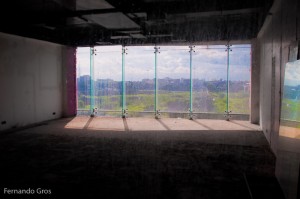Advent 2010
The link escapes me right now, but I recall reading an idea someone had recently, to photograph Christmas trees, in public spaces, for twelve days leading up to Christmas. Get it? The twelve days of Christmas trees? Clever and, of course, misguided. The twelve days of Christmas start on Christmas Day, rather than ending on […]
The link escapes me right now, but I recall reading an idea someone had recently, to photograph Christmas trees, in public spaces, for twelve days leading up to Christmas. Get it? The twelve days of Christmas trees?
Clever and, of course, misguided. The twelve days of Christmas start on Christmas Day, rather than ending on Christmas Day. In fact, if we want to be all traditional (and liturgical) about it, the Christmas season runs from Christmas eve, on the 24 of December, through to Epiphany, on the 6th of January (and in some calendars through to Candlemas on the 2nd of February).
So, why do we put up decorations and sing seasonal songs in the weeks leading up to Christmas? In our popular culture we’ve actually blended (or maybe, confused) two seasons, Christmas and Advent. Christmas is a season that celebrates the birth of Jesus (Bethlehem, the manager and the three wise men) and explores the meaning of that (peace on earth, goodwill to men).
Advent is a season of preparation for Christmas. I guess, in modern parlance, we might call it the pre-Christmas season. The focus of Advent is on ourselves – our need for hope and, ultimately salvation. If Christmas is all about big bright lights (encapsulated in the image of the bright star that led the three wise men), then Advent is about light coming into the darkness; symbolised by the slow lighting of advent candles, one per week in the four weeks leading up to Christmas.
In the same way, Advent carols are not the same as Christmas carols. Advent carols are sung in preparation for Christmas and focussed on themes of hope, longing and expectation. Perhaps the most famous Advent carol is Veni Veni Emmanuel, which we sing in English as O Come O Come Emmanuel,
O come, O come, Emmanuel
And ransom captive Israel
That mourns in lonely exile here
Until the Son of God appear
Rejoice! Rejoice! Emmanuel
Shall come to thee, O Israel.
The verses of this famous song are built around the seven antiphons, or titles attributed to Jesus in the Old Testament, each of which speaks to the hope that a Messiah, or Saviour would arise for Ancient Israel.
“Therefore the Lord himself will give you a sign. Behold, the virgin shall conceive and bear a son, and shall call his name Immanuel.” Isaiah 7.14
While Christmas is all about feasts and celebration, Advent is a leaner season of contemplation. Advent is patience, poetry and delayed gratification. Advent is about recognising the darkness within us and accepting that maybe we need to change, to grow, to learn. Advent is an antidote to the hyper-commercialised Christmas (shopping) season we now experience.
In fact, Christmas has not just become a season of crass-consumerism, it has also become a season of confusion and crumbling hope. Relationships break-up at Christmas with more alacrity than at any other time of the year. Incidents of domestic violence, suicide attempts and substance abuse also hit high levels at this time of year. Although Christmas is, in the minds of many, “all about the children,” parents seem more harried and distressed with each passing season.
Perhaps Advent is too traditional, archaic and theologically heavy to be revived without some major transformation. But, when we are honest about what Christmas has become, it might be our best bet to look to the past a little and consider what a fuller, rather than more superficial understanding of this season might offer us.





